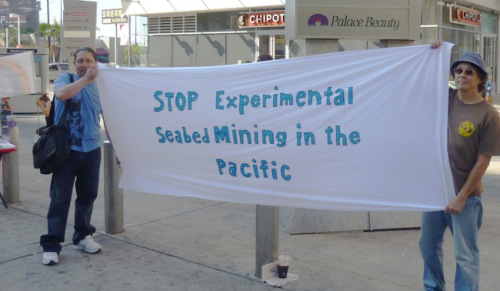STOP EXPERIMENTAL SEABED MINING IN THE PACIFIC MESSAGE ON THE STREETS OF LOS ANGELES

Carlos Kleeman and Arnie Saiki at the So Cal Climate Action 350 rally in Los Angeles
Source: PNG Mine Watch
“People’s Climate March Los Angeles — Building Blocks Against Climate Change” took place on Saturday on LA’s Wilshire Boulevard as world leaders gathered in New York City to confront climate change. Los Angeles joined the hundreds of thousands of people worldwide demanding they take action before it’s too late.
We shared our “Stop Experimental Seabed Mining in the Pacific” banner along LA’s iconic Wilshire Boulevard in a chain of interlinking block protests. Many diverse groups and individuals created their part of a network of protests extending block after adjacent block between Wilton Place and Alvarado Street at MacArthur Park.
Few had heard of seabed mining or the technologies being developed to raze the ocean depths, but everyone understood the dangers of encroaching upon the delicate biodiversity of the ocean.
Coincidenally, an article describing the deep seabed mining gold rush as a ‘game changer’, came out the day before, describing the investment benefits of seabed mining.
Mining expert Stephen Land of Franklin Gold & Precious Metals, a Sacramento, CA based investment firm, said the advances being made in this industry will prove significant for precious metal supply and for mining investors.” Further he stated, “It has the potential for real exploration and development upside compared with onshore areas where everything has been picked over fairly well. It’s not to say there won’t be new onshore discoveries but you are unlikely to find a whole systematic game-changer like this.”
Sharing information about the investment and mining sector and its impact on climate change was nothing new to the protesters, but what was however, was that few people knew about deep seabed mining and the licenses that were being granted by the UN International Seabed Authority to countries for exploration of the deep seabed for minerals.
The opportunity for building a cross-Oceania community around experimental seabed mining was ripe. Many campaigners in Los Angeles have already been activated to new trade partnerships like the Trans-Pacific Partnership agreement (TPP) being negotiated between twelve Pacific rim countries. Connecting both the military and industrial trade sectors like seabed mining to the binding neoliberalism that the US is pushing for in the TPP evoked strong reactions from people.
Los Angeles is a center for the aerospace industry, just as Wall St. is the financial center. A few hours north of LA is Vandenberg Air Force Base, the launch pad for the Minuteman III Interrcontinental Ballistic Missiles (ICBMs) that have resumed testing across the Pacific to the Marshall Islands. Lockheed Martin is both the principle developer of ICBMs as well as one of the principle actors involved in the technological end of seabed mining. They hold many of the patents nececssary for seabed mining, and as one of the US’s largest military contractors, they have also been one of the industrial architects of Obama’s rebalancing of economic and security presence in the Asia-Pacific region.
Seabed mining is already creating conditions for militarization. The Pacific Remote Islands Marine National Monument (PRIMNM) proposal announced by Obama a few months ago seeks to annex about 2 million square kilometers of territory from Hawaii to American Samoa to Wake Island and promises to make a broad swath of the central Pacific Ocean off-limits to fishing, energy exploration and other activities, like shipping and transport. As all US environmental reserves, there are loopholes within the legislation which exempt economic and military “national security” from regulations.
Cross-Oceania partnerships need to remain vigilent and connected. From China to Chile and Canada to Australia, if there is one objective we can work towards as a Peoples’ Action against Climate Change, it should be that Pacific Island peoples should hold the reins of regulations over the biodiversity of our Moana Nui, our Wansolwara, our one Pacific. We should not allow the large economies surrounding the Pacific Small Island States and Occupied Island Territories to dictate our access and terms of trade, militarization and industrialization to our peoples, economies and resources.
Moana Nui, a group member of the SoCal Climate Action Coalition, was not a part of the “Building Blocks against Climate Change” planning committee, however we wanted to draw attention to the Stop Experimental Seabed Mining in the Pacific campaign, led by Bismarck Ramu Group (BRG), the Pacific Network on Globalization (PANG) and ACT NOW!. We asked one of the principle organizers and speakers, Jack Eidt, from Wilder Utopia, if we could join in with their group. He said, “You are 100 percent welcome to bring the banner. It is an important issue.”
- Elizabeth1's blog
- Log in to post comments
